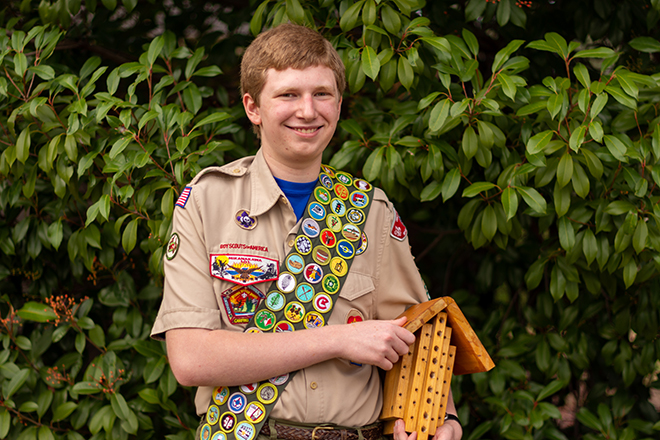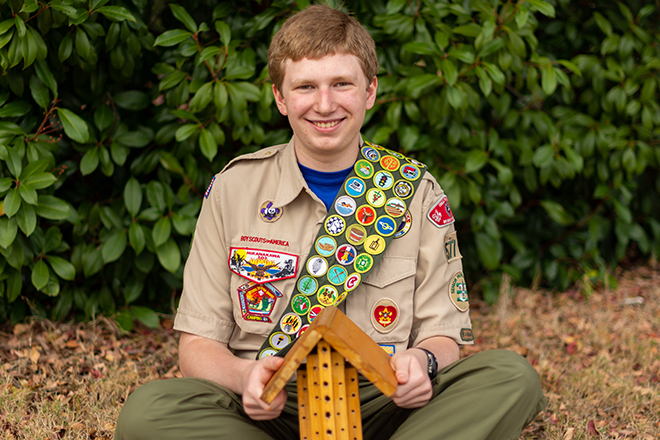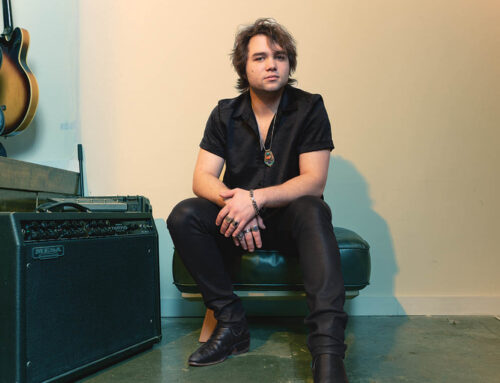
Photography by Carly May
In the Doctor Who episode “The Stolen Earth”, migrant bees leave the Earth to go back their original planet. The story piqued St. Mark’s junior Spencer Burke’s interest. He started reading about colony collapse disorder, when entire colonies of honeybees abruptly disappear. The “beepocalypse”, a term coined in 2006, made news headlines across the country. Turns out honeybees haven’t rapidly declined: Everyone was up in arms about the wrong bee.
Instead, the 16-year-old Burke’s research showed solitary bees are declining. Every female solitary bee is a queen. They are all fertile and burrow into the ground to lay eggs. Unlike communal honeybees, solitary bees are responsible for the bulk of pollinating crops and wild plants.
Burke’s parents where skeptical at first but signed him up for classes so he could gain a basic understanding of bees. He decided he would focus solely on solitary bees and began formulating a plan.
“It’s a global issue. There’s no way I can truly make a huge difference in global scale. But if I can make a difference in the local scale, that can eventually reach a global scale,” Burke says.
Pests, pathogens, pesticides and habitat loss are leading causes of solitary bee decline, he says.
“There’s very little I can do about global warming,” Burke says. “I can’t really prevent people from using pesticides, but I can address a habitat loss and mass urbanization, which is arguably the biggest cause.”
DID YOU KNOW…
Female solitary bees are all fertile and burrow into the ground to lay eggs.
A FEW FAVORITE THINGS…
When Burke isn’t working on his bee project or juggling six Advanced Placement classes, he loves playing chess. He has an affinity for classicist culture. Murray Gold, the composer behind Doctor Who (2005), is one of his favorite lively orchestral musicians. Burke plays trombone and euphonium. He’s a fencer on St. Mark’s varsity team. Friday nights are for Dungeons and Dragons. Burke would love to pick up blacksmithing. “I can’t convince my parents to let me build a forge. For some reason, their argument is ‘you’re going to burn the house’,” Burke says.

Burke obtained Twelve Hills Nature Center board president Marcie Haley’s contact information from his brother, who had volunteered at the center. His plan came together early in his sophomore year: Burke would work on revitalizing native wildlife on a tract of land to help combat habitat loss for the bees.
A team made up of his family, his Boy Scout troop and other friends spent eight hours on the first workday digging up enough grass to fill 21 contractor bags. Once they removed invasive species — Johnson, Bermuda and Chinese Privet — native grasses such as big bluestem and Indian grass spread and served as a citadel for other native plants.
“We came back, and we saw giant big bluestem that wasn’t there before. It showed me that we actually had done something that was semi-effective. And it just wasn’t a waste of time,” Burke says.
Before he heads off to college, Burke wants to see the Twelve Hills’ spot fully integrated with native plants, and he plans to install 100 solitary beehives throughout Dallas. Burke says he attended a conference where he introduced himself to City of Dallas urban biologist Brett Johnson. Burke told Johnson he was interested in building solitary beehives and installing them throughout the city.
“It’s a surreal feeling. I’ve been in the right place the right time. A lot of times,” Burke says.
Johnson and Burke are working on a distribution plan to be executed in the next few months.
“It’s a reminder that you don’t have to wait ’til you’re 25 to make a difference. You don’t have to wait ’til you’re 23. You don’t have to wait ’til you’re 17,” Burke says. “You can make a difference whenever. It’s all up to you.”






